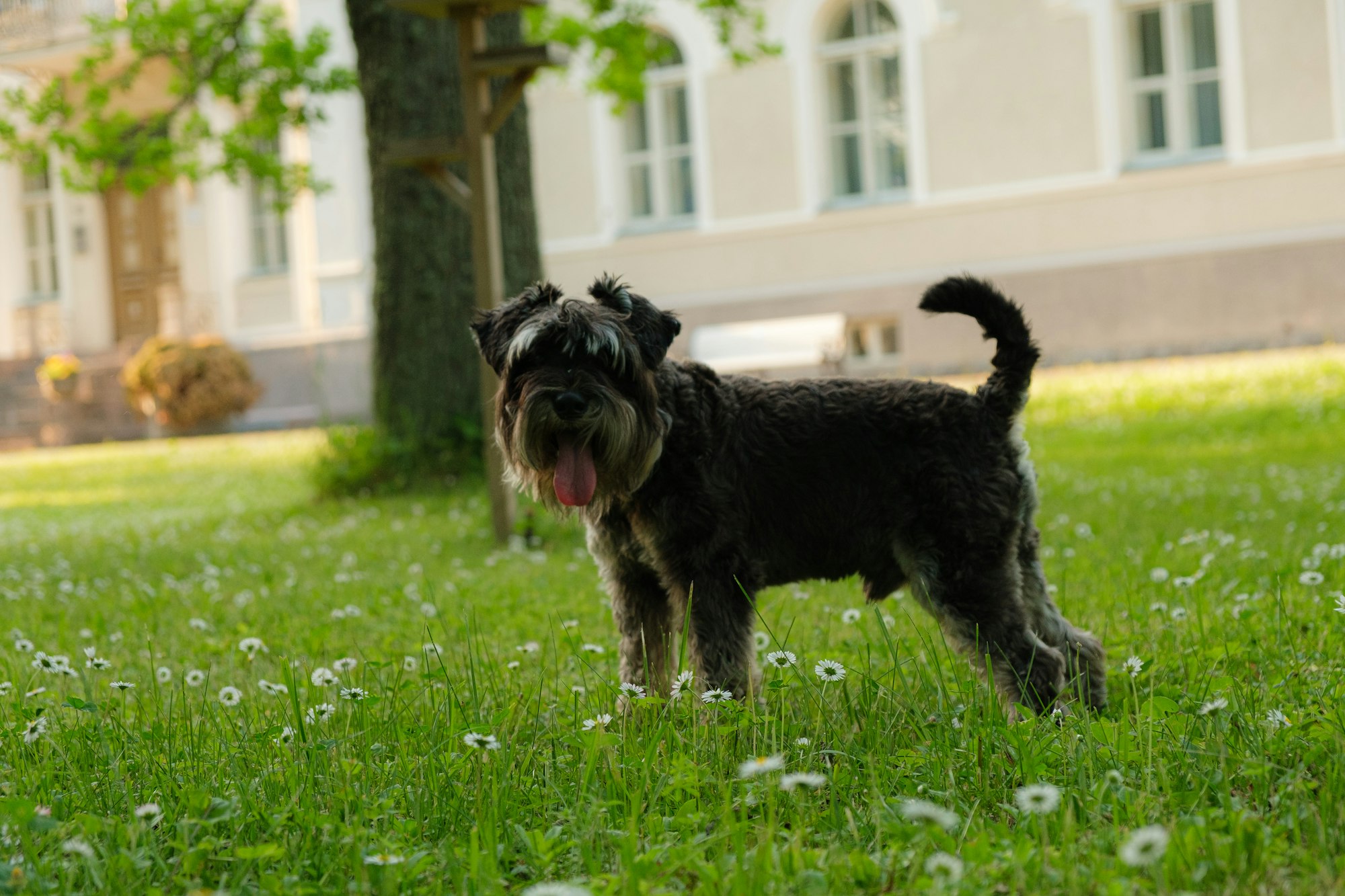Miniature Schnauzers are known for their charming appearance and delightful personalities, but a common concern among prospective owners revolves around their barking tendencies. Let's delve into the factors influencing these behaviors and explore effective strategies for managing and understanding the barking habits of these endearing canines.

Understanding the Nature of Miniature Schnauzers
Miniature Schnauzers are renowned for their distinctive appearance, characterized by their bushy eyebrows, bristly mustaches, and wiry coats. Beyond their charming exterior, understanding the nature of these pint-sized canines is crucial, especially when it comes to their barking tendencies.
Inherent Alertness
One of the defining traits of Miniature Schnauzers is their inherent alertness. Bred as watchdogs, these little companions have a natural inclination to be vigilant and responsive to their surroundings. This alertness often translates into a keen sense of when to bark, making them excellent at alerting their owners to potential threats.
Territorial Instincts
Miniature Schnauzers are inherently territorial. This territoriality is a byproduct of their history as farm dogs, where they were tasked with keeping pests at bay. As a result, they tend to be protective of their home and family, often expressing this protectiveness through barking.

Social Nature
Despite their small size, Miniature Schnauzers are social creatures. They thrive on companionship and interaction with their human family members. When left alone for extended periods, they may resort to barking as a means of expressing their loneliness or seeking attention.
Factors Influencing Barking Behavior
Understanding why Miniature Schnauzers bark excessively involves delving into various factors that influence their behavior. Addressing these factors is key to managing and controlling their barking habits.
Lack of Socialization
Miniature Schnauzers require early and consistent socialization. If not exposed to various environments, people, and other animals during their formative months, they may become anxious or overreactive, leading to heightened barking.
Anxiety and Stress
Just like humans, dogs can experience separation anxiety and stress. Changes in routine, unfamiliar situations or loud noises can trigger stress in Miniature Schnauzers, manifesting as increased barking. Identifying and alleviating sources of anxiety is crucial.
Environmental Triggers
External stimuli, such as the doorbell ringing, passing cars, or the presence of strangers, can act as triggers for barking. Recognizing these triggers and implementing positive reinforcement techniques can help modify their response.
Training Techniques for Barking Control
Controlling a Miniature Schnauzer's barking involves a combination of training techniques that focus on positive reinforcement and consistent commands.
Positive Reinforcement
Reward-based training is highly effective with Miniature Schnauzers. When they exhibit desired behavior, rewarding them with treats or praise reinforces the idea that not barking is a positive action. This positive association encourages them to bark less.
Consistency in Commands
Consistency is key in any dog training, and Miniature Schnauzers are no exception. Using clear, consistent commands for quietness and enforcing them every time reduces confusion and reinforces the desired behavior.
Professional Training Assistance
For owners facing challenges in curbing excessive barking, seeking professional assistance from dog trainers or behaviorists can provide tailored strategies and insights. Professional guidance ensures a customized approach that suits the individual needs and personality of the Miniature Schnauzer.
Physical Exercise and Mental Stimulation
Keeping Miniature Schnauzers physically active and mentally engaged is paramount for their well-being and can significantly impact their barking behavior.
Impact on Barking Behavior
Regular exercise not only ensures that Miniature Schnauzers maintain a healthy weight but also helps them expend their energy, reducing the likelihood of excessive barking. Engaging in activities like brisk walks, play sessions, and interactive dog toys provides an outlet for their natural enthusiasm.
Ideal Activities for Miniature Schnauzers
Considering their agility and intelligence, activities that challenge them mentally are as important as physical exercise. Puzzle toys, obedience training, and agility exercises not only tire them out but also stimulate their minds, preventing boredom-related barking.
Grooming and Health Considerations
Surprisingly, grooming plays a role in the overall behavior of Miniature Schnauzers, and maintaining their health is integral to managing their barking tendencies.
Grooming's Role in Behavior
Regular grooming sessions, including brushing their distinctive double coat and keeping their facial hair tidy, contribute to their overall comfort. A well-groomed Miniature Schnauzer is less likely to exhibit discomfort-related barking, emphasizing the link between physical well-being and behavior.
Health Issues Leading to Excessive Barking
Certain health problems, such as dental issues or joint pain, can contribute to increased barking. Regular veterinary check-ups ensure that potential health concerns are identified early and addressed, preventing unnecessary barking caused by discomfort.

Realistic Expectations for Owners
Setting realistic expectations is fundamental to cultivating a positive relationship with Miniature Schnauzers and understanding their unique barking characteristics.
Acceptance of Natural Instincts
Recognizing that barking is a natural instinct for Miniature Schnauzers is the first step. As watchdogs, they are predisposed to vocalize, and attempting to eliminate barking entirely may be unrealistic. Instead, the focus should be on managing and redirecting this behavior.
Recognizing Excessive Barking
While barking is part of their nature, owners need to differentiate between normal alert barking and excessive, incessant barking. Understanding the context of their barking helps in identifying whether it's a response to a perceived threat or a behavior that needs modification.
Setting realistic expectations, incorporating regular exercise and mental stimulation, and addressing grooming and health considerations contribute to a balanced and well-behaved Miniature Schnauzer. By embracing their natural instincts while providing the necessary care, owners can foster a happy and content canine companion.
Case Studies and Success Stories
Learning from the experiences of other Miniature Schnauzer owners provides valuable insights into effective strategies for managing and understanding barking behaviors.
Owners' Experiences
Real-life case studies offer a glimpse into the challenges faced by Miniature Schnauzer owners and how they successfully navigated them. These stories often highlight the uniqueness of each dog's personality and the various approaches owners took to address specific barking issues.
Implementing Effective Strategies
Successful outcomes in case studies often involve a combination of training techniques, environmental modifications, and patience. Owners share their journeys of implementing positive reinforcement, consistent commands, and, in some cases, seeking professional guidance. These success stories inspire and guide others facing similar challenges.
Common Myths about Miniature Schnauzers and Barking
Dispelling common myths is crucial in understanding the true nature of Miniature Schnauzers and their barking tendencies.
Debunking Misconceptions
Myth 1: Miniature Schnauzers bark excessively due to aggression.
Contrary to this belief, their barking is often a result of their watchdog instincts and desire to protect their family. Understanding the motivation behind the barking helps in addressing it effectively.
Myth 2: All Miniature Schnauzers bark the same.
Each Miniature Schnauzer is an individual with a unique personality. While the breed may share certain traits, the intensity and frequency of barking can vary widely. Generalizations may lead to ineffective training approaches.
Understanding Individual Variations
Myth 3: Excessive barking is a sign of a poorly trained Miniature Schnauzer.
While training plays a role, other factors such as socialization, health, and the dog's environment contribute to barking behavior. It's essential to consider a holistic approach to address excessive barking.
Myth 4: Barking can be completely eliminated in Miniature Schnauzers.
Barking is a natural form of communication for these dogs. While training can significantly reduce excessive barking, complete elimination may not be realistic. Managing and redirecting the behavior is a more attainable goal.
Dispelling these myths allows owners to approach their Miniature Schnauzer's barking behavior with a more informed and realistic perspective. By understanding the factors influencing barking and recognizing the uniqueness of each dog, owners can build a stronger bond with their furry companions while effectively managing their barking tendencies.

The Importance of Professional Guidance
While owners can address many aspects of their Miniature Schnauzer's behavior, seeking professional guidance is invaluable in certain situations.
When to Consult a Veterinarian
If excessive barking is sudden or accompanied by other behavioral changes, consulting a veterinarian is crucial. Underlying health issues, such as pain or discomfort, can manifest through changes in behavior, including barking. A vet can conduct thorough examinations and diagnostics to rule out health-related causes.
Seeking Assistance from Dog Behaviorists
Professional dog behaviorists possess the expertise to analyze and understand the root causes of behavioral issues. They can tailor training plans to address specific concerns and work with both the happy dog and the owner to create effective, personalized solutions. Consulting a behaviorist ensures a comprehensive approach to managing barking behaviors.
Balancing Affection and Discipline
Creating a harmonious relationship with a Miniature Schnauzer involves finding the right balance between affection and discipline.
Creating a Positive Environment
Miniature Schnauzers thrive in a positive and loving environment. Offering affection, praise, and rewards for good behavior reinforces positive habits. Creating a space where the dog feels secure and loved fosters a strong bond between the owner and the pet.
Setting Clear Boundaries
While affection is crucial, setting clear boundaries is equally important. Establishing rules regarding behavior, such as when and where barking is acceptable, helps the Miniature Schnauzer understand expectations. Consistency in enforcing these boundaries reinforces discipline and prevents confusion.
Balancing affection with discipline creates a positive and structured environment where Miniature Schnauzers can thrive. By finding this equilibrium, owners not only nurture a loving relationship but also cultivate well-behaved and content canine companions.
Miniature Schnauzer Breeding Practices
Understanding the breeding practices surrounding Miniature Schnauzers is essential for prospective owners to make informed decisions and comprehend the potential impact on their behavior.
Impact on Behavior Traits
The breeding practices employed significantly influence the temperament and behavior traits of Miniature Schnauzers. Responsible breeders prioritize not only physical characteristics but also the dog's disposition, including barking tendencies. When selecting a Miniature Schnauzer, it's crucial to choose a breeder who prioritizes breeding for a well-balanced temperament.
Responsible Breeding and Temperament
Reputable breeders focus on responsible breeding practices, considering factors like genetic health, socialization, and temperament. Miniature Schnauzers bred with care are more likely to exhibit stable behavior, making them easier to train and manage in terms of barking tendencies.
Community Insights and Forums
Engaging with the Miniature Schnauzer community through online forums and discussions provides valuable insights into real-world experiences and shared knowledge.
Learning from Other Miniature Schnauzer Owners
Online communities and forums bring together Miniature Schnauzer owners from diverse backgrounds. Sharing experiences, challenges, and success stories allows for a richer understanding of the breed's behavior, including barking habits. Learning from the firsthand experiences of others can provide practical tips and strategies.
Online Resources for Support
Various online resources cater specifically to Miniature Schnauzer owners. These platforms offer a wealth of information, from training techniques to health considerations. Participating in discussions and seeking advice from seasoned owners can be instrumental in navigating and addressing barking concerns.
Understanding the breeding practices that influence Miniature Schnauzer behavior empowers owners to make informed choices, while community insights and forums offer a supportive network for shared knowledge and experiences. By combining these elements, owners can enhance their understanding of their Miniature Schnauzer's behavior and build a stronger connection with their furry companions.
Conclusion
Understanding and addressing the barking habits of Miniature Schnauzers require a combination of training, environmental considerations, and a realistic outlook. By delving into their nature, implementing effective strategies, and seeking professional guidance when needed, owners can foster a happy and harmonious relationship with these charming companions.

FAQs
1. How much barking is normal for a Miniature Schnauzer?
- Answer: Miniature Schnauzers are known for their alert and vocal nature. Some barking is normal, especially in response to perceived threats or changes in their environment. However, excessive or constant barking may indicate a need for attention, training, or addressing potential triggers.
2. Can excessive barking be a sign of health issues?
- Answer: Yes, persistent barking can sometimes be a sign of underlying health problems, discomfort, or pain. If a Miniature Schnauzer suddenly exhibits excessive barking or a change in behavior, it's advisable to consult a veterinarian to rule out any health-related issues.
3. What age should training for barking begin?
- Answer: Training for barking should ideally begin during the puppy stage. Starting early allows owners to instill positive habits and reinforce behaviors that help manage barking tendencies. Consistent training with positive reinforcement yields the best results.
4. Are there specific breeds Miniature Schnauzers get along with better?
- Answer: Miniature Schnauzers are generally sociable dogs and can get along well with various breeds. However, individual temperament and socialization play significant roles. Proper introductions and monitoring interactions are key to fostering positive relationships between Miniature Schnauzers and other breeds.
5. How to handle barking during the night?
- Answer: Nighttime barking can be managed through a combination of proper training and creating a conducive sleeping environment. Ensuring the dog is sufficiently exercised during the day, providing a comfortable sleeping space, and using positive reinforcement for quiet behavior contribute to minimizing nighttime barking.




